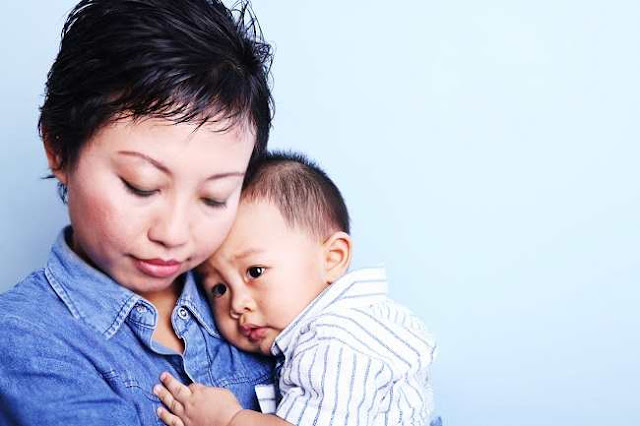Hi Husbands, Understand Post-Birth Depression That Can Attack Your Wife
For Father and Mother, the presence of a baby must have been eagerly awaited with joy. But after giving birth, it turns out emotions that hit Mother can be mixed out of control. Not only is the joy and excitement overflowing, but it may also be accompanied by anxiety and fear, and an unexpected attack of depression can color the Mother's mood at that time. According to a child health site, for most women after childbirth, feelings of sadness and excessive emotions are more common.
It is common for a woman to experience baby blues after giving birth. The term baby blues refers to the symptoms of sad emotions, anxiety, whiny, fatigue, loneliness, and stress that afflict Mother after giving birth. But in some cases, which is about 1 in 7 mothers, experience more serious baby blues or postpartum depression. This condition can affect the ability of mothers to care for themselves and their babies. At some point, it can be life-threatening so it needs to be handled properly.
Postpartum depression (PPD) is often misunderstood as an ordinary baby blues condition. Though both are different mood disorders. The difference between the two lies in the intensity and duration of the process. The condition of baby blues is not pleasant, but it is normal with mild and temporary symptoms. After about 14 days postpartum, baby blues will disappear. If the symptoms continue for more than 14 days, then the condition can already be referred to as PPD. PPD symptoms usually appear within a range of a few weeks after giving birth or can also appear until six months postpartum.
Signs of Post-Birth Depression
PPD can afflict all women regardless of age, income, education, ethnicity, race or culture. PPD can occur in women who have given birth for the first time or a second birth or so on, both to women who give birth after marriage or are not married, both whose pregnancies are going well or experiencing problems. Do not hesitate or be ashamed to ask your doctor or psychologist for help if your wife experiences the following symptoms that last more than a few weeks.- Thinking of hurting the baby or yourself.
- A frightening thought crossed.
- Fear of being left alone with a baby.
- Not interested in babies, family and relatives.
- Fear of not being a good mother.
- Excessively angry.
- Sad and crying uncontrollably for a long time.
- Restless or panicked.
- Feeling guilty, worthless, or self-blame.
- Difficulty in concentrating, remembering details, or making decisions.
- Loss of interest and pleasure in things that can usually be enjoyed, including sexual relations.
- Dietary changes occur, such as eating far more or less than usual.
- Changes in sleep patterns, become too much sleep, unable to sleep, or difficulty falling asleep.
- Feel miserable.
Why Does a Wife Can Have Postpartum Depression?
Don't blame your wife for the PPD condition she is experiencing. There is no woman who wants to experience PPD. Happiness to have a baby is a dream many mothers. Therefore, the husband must try to accompany his wife while undergoing difficult times and support her to recover from PPD. The cause of PPD itself is medically associated with factors of hormonal changes in the body after childbirth. These hormonal changes have an impact on mood or energy and energy. During pregnancy, the hormones estrogen and progestron rise, whereas after giving birth, suddenly the hormone levels drop. In some cases, your thyroid hormone levels also decrease. The rapid decrease in hormone levels affects the compounds in the brain so that the visible result is a prolonged emotion of sadness and depression. Stress hormones can also add effects to mood. Some women can experience this condition worse than others.For Husbands, Do This
If your wife has PPD, don't let her struggle alone. Take a few steps that can help him recover and become happy and healthy like the following.- Be patient and kind to your wife, including speaking softly. The wife must also be patient in facing her condition. Encourage your wife to be patient too and say that it takes time to feel better and in the end you and your family will be really better.
- Trust your wife and remind her how much she really has strength and good qualities. Encourage your wife to be grateful and think optimistically.
- Together with your wife, read information about PPD.
- Encourage your wife to talk to a psychologist. Do not give up even though sometimes women who experience PPD are reluctant to seek help from a psychologist or are not aware of the symptoms well.
- Put your attention on your wife, like listening to her if she wants to talk and checking regularly what she is doing.
- Give your wife time to take a break from her responsibilities in caring for children and households. You can ask for help from parents, siblings, relatives, or helpers to do tasks that are usually done by the wife.
- Make sure your wife consumes nutritious food regularly.
- Help your wife take care of your newborn baby so she can take a nap or take a relaxing bath.
- Take your wife for a light walk, try to do this every day. This activity can help improve your wife's mood.
- Do fun little things like visiting relatives, listening to music, enjoying a cup of tea or warm milk.
- As much as possible, provide a quiet room for the baby to sleep well, and let your wife sleep too when the baby sleeps.



Comments
Post a Comment